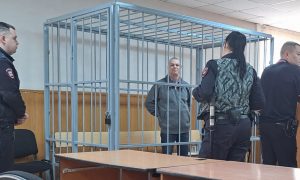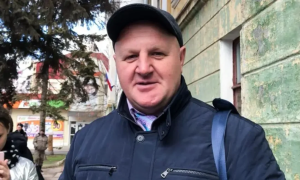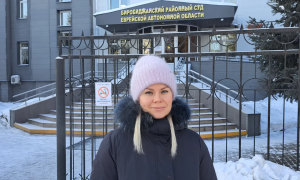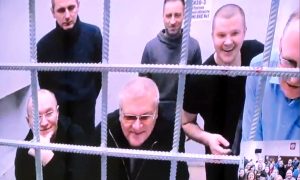Despite a court ruling by Russian judges in October that seemed to endorse leniency for Jehovah’s Witnesses arrested after their faith was labeled “extremist,” a recent rash of sentences against members of the faith group has prompted concern among human rights advocates that the government is continuing its earlier crackdown against the denomination.
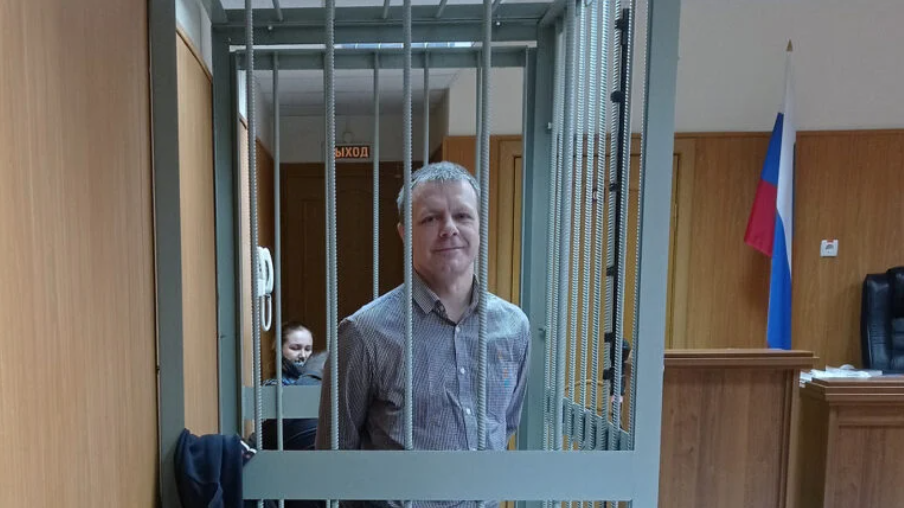
More than 80 Jehovah’s Witnesses are now in confinement in Russia, some awaiting trial and some imprisoned after being convicted.
“USCIRF had hoped that a … 2021 decision by the Russian Supreme Court banning the prosecution of Jehovah’s Witness group prayer signaled a shift in official policy towards the group, but this is clearly not the case,” said U.S. Commission on International Religious Freedom commissioner Khizr Khan in a statement to Religion News Service.
“The Russian government’s persecution of the Jehovah’s Witnesses has gained renewed momentum in the last week,” Khan said.
On Thursday (Jan. 20), a court in Seversk sentenced Yevgeniy Korotun, a Jehovah’s Witness who had been detained since July 2020, to seven years and Andrey Kolesnichenko to four. Their convictions occurred a day after Aleksey Yershov, a 68-year-old member of the religious group, was sentenced to three years in a penal colony.
Korotun, according to the Jehovah’s Witnesses, was charged on the basis of hidden recordings of him conversing about the Bible. The religious group said Kolesnichenko was recorded by someone who acted interested in the Bible and turned the recording over to authorities.
Yershov, also accused based on recordings, was charged for “extremist” activities, including praying, singing religious songs and participating in worship services.
“That is the largest number of Jehovah’s Witnesses behind bars since the Russian Supreme Court banned as ‘extremist’ the whole Jehovah’s Witness organization in Russia,” said Rachel Denber, deputy director of Human Rights Watch’s Europe and Central Asia Division, in an interview Thursday from Moscow, referring to the dozens of imprisoned members of the faith group.
“The fact that there are actually people behind bars for doing nothing more than worshipping or supporting worship is — it should be unthinkable in our times. And yet it’s happening and yet it continues.”
In Russia, conviction of a charge involving “grievous bodily harm” has a maximum prison sentence of eight years; kidnapping has a maximum of five years; and a rape conviction leads to a sentence of three to six years.
“The escalating discriminatory assault against Jehovah’s Witnesses is putting a huge burden on a growing number of families to support themselves without the help of their husbands and fathers, who were often the family’s primary source of income,” said Jarrod Lopes, a spokesman for the Jehovah’s Witnesses, in a statement.
“We hope that soon the callous persecution of Jehovah’s Witnesses in Russia will end — families will no longer be needlessly separated — and they can worship freely in their home country as they do in over 200 other lands.”
The International Memorial Society, a judicial watchdog organization whose affiliated center published a list of political prisoners, including Jehovah’s Witnesses, was closed by Russian courts in late December, according to The Washington Post. The crackdown on the group, known as Memorial, was condemned by USCIRF, which called it “an irreplaceable resource for monitoring severe persecution, including religious freedom conditions in Eurasia.”
Asked on Thursday how the closure would affect the situation with Jehovah’s Witnesses, Denber said: “It’s certainly not good news for them.”
In December, a dozen members of the International Religious Freedom or Belief Alliance, including the United States, issued a joint statement declaring their “grave concern” about “the increased repression of Jehovah’s Witnesses in a number of countries.”
At a virtual news conference on Wednesday where the religious freedom organization Open Doors announced its 2022 World Watch List, Rashad Hussain, the new U.S. ambassador-at-large for religious freedom, said in a prerecorded video, “The alliance has spoken out forcefully against repression of Jehovah’s Witnesses worldwide, Christians and other religious minorities at risk in Afghanistan, and of other oppressed religious minorities in several other countries.”
He added, “Strong diplomatic and political measures often follow these statements.”
In 2019 Russian President Vladimir Putin told human rights advocates that assertions that Jehovah’s Witnesses were classified as being part of a destructive or terrorist organization were “complete nonsense.”
“Jehovah’s Witnesses are Christians too. I don’t quite understand why they are persecuted,” Putin said. “So this should be looked into. This must be done.”
But since that time, Denber said, “That didn’t go anywhere.”


